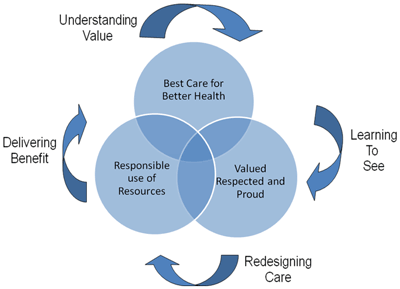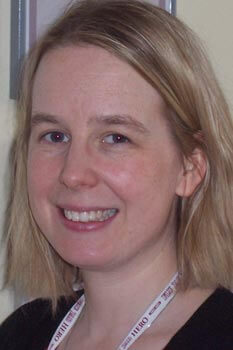Maureen Browne describes how senior leaders, partners, GPs, the local authority and patient representative organisations worked together to design a new organisation focusing much more on transformational activity along the whole end-to-end pathway with a much bigger focus on population health.
Royal Bolton Hospital NHS Foundation Trust started its own lean journey back in 2005 and pioneered the use of lean in healthcare in the UK.

Lean was chosen as it offered an organisational philosophy and framework for transformation that clearly focused on patient (customer) value and experience at its heart. However, lean needed some adaptation to work in the complex world of healthcare and so the Bolton Improving Care System (BICS) was born
(see Fig 1) with its key elements being:-
- Understanding Value from the perspective of the customers of the service
- Learning to see is integral to the BICS philosophy and is key to ensure leaders within the organisation fully understand the work that is taking place within the organisation.
- Redesigning care – staff at all levels, including leaders, of the organisation are involved in week long improvement events making transformational changes linked to corporate goals.
- Delivering Benefit – For example: respiratory services have developed effective team working with strong clinical leadership to deliver reduced length of stay, decreased mortality, reduced readmissions, improved productivity and reduced step up to critical care for patients with respiratory illness, and above all improve the safety of care and the patient experience.
During the last year, the Trust has appointed a new Chief Executive, Lesley Doherty, who led much of the early development of BICS as Chief Operating Officer of the Organisation.

Following consultation in spring 2010 it was announced that key services from NHS Bolton Primary Care Trust (PCT), and Royal Bolton NHS Foundation Trust (RBH), would be integrated from April 2011. The challenge in 2011 is to make this happen effectively. This is a unique opportunity to ensure leaders in both organisations gain sufficient understanding of the challenges going forward to lead such a transformation congruent with lean principles. Lesley is now leading the integration of the Trust with the local community healthcare provider with the aim of creating the first lean integrated care organisation in the UK against the backdrop of delivering the challenges for the future which include delivering the white paper “Liberating the NHS” whilst in an austere climate.

This has provided a unique opportunity and a platform to build on previous quality improvement work within both organisations
To help bring together two organisations with potentially different values and perspectives, in November 2010, both organisations participated in an Enterprise-wide Value Stream Analysis (EVSA) – a Vision and Strategy BICS Event for the top 120 leaders and stakeholders for the new integrated organisation, including our patients. The event, led by Lesley Doherty, aimed to both celebrate the achievements of the current organisations, but also recognise and respect the needs of the future, for both patients and staff. This was an important step for the new organisation’s development to start building relationships for the future. The event was well supported by senior and influential medical staff and provided an environment to design the principles of a new clinical model and leading to the design of the new organisational structure based around pathways, and build the foundations for meeting the new organisational challenges and working together.
The Trust has demonstrated its application to transformational change and maintained and ensured respect for its staff and patients
Key was the imperative of engaging senior leaders, partners, GPs, local authority, patient representative organisations to work together to design a new organisation focusing much more on transformational activity along the whole end-to-end pathway with a much bigger focus on population health.

Using learning from other organisations, during times of major transitions there can often be reduced performance and low morale. To mitigate this possibility there will be a determined focus on the needs of the patient and the use of BICS methods to work with staff to create the culture of bottom up engagement and identity for the new organisation. While it is challenging for leaders to allow bottom up development of solutions to the problems that will exist, the Trust believes this will help staff throughout the organisation think wider than their own self-interest and be prepared to redesign the way care is delivered from a patient perspective and benefit.
There is already in place a system of ‘Big and Little Conversations’, this is an appreciative inquiry methodology. Here staff are engaged at all levels providing context for change, reviewing what is it like to work in Bolton, what can be done to improve staff and patient experience. For the integration process, they have undertaken a three month process with staff from both organisations looking to influence the culture and values of working together in the future. This provides leaders in the organisation to have a mandate to develop staff autonomy and for staff to understand and accept the responsibility and accountability this brings.
During the EVSA, discussion took place regarding the interpretation and understanding of the Trust’s ‘True North Goals’ or its direction of travel, core objectives and intent to get there. The Trust’s first True North is striving for excellence in all it does for its patients who are at the centre of their care and as a major employer for its staff, underpinning its aim with the following intent
- Best care for better health –at population and individual level
- Valued, respected and proud – for our staff and patients
- Responsible use of resources – ensuring a sustainable and viable health care provision
Of key importance is to ensure the True North goals developed for the new organisation provide a shared vision for staff in either sector. The True North goals also need to be agreed by both organisations as being reflective of their aims and in a language that could be understood by users of the service and staff.
The Trust believes it is essential that all improvement work carried out as it goes forward is aimed at making a difference to the True North goals.
Lesley Doherty, Chief Executive, said “We are all responsible for this new organisation, and become a leadership team that works together to common goals. Making real and deliverable changes will be a big, exciting, achievable challenge”
In conclusion by using the BICS approach the Trust has demonstrated its application to transformational change and maintained and ensured respect for its staff and patients. In agreeing and following its True North goals it has enabled over a six month period a bottom up, consulted and consensual Model of Care that will develop into integrated care organisation across Bolton from April 2011.
Lesley Doherty is Chief Executive, Joy Furnival is Head of Lean Transformation and Carol Bernstein is Improvement Lead, Anaesthetics and Surgery Division, at the Royal Bolton Hospital NHS Foundation Trust.

